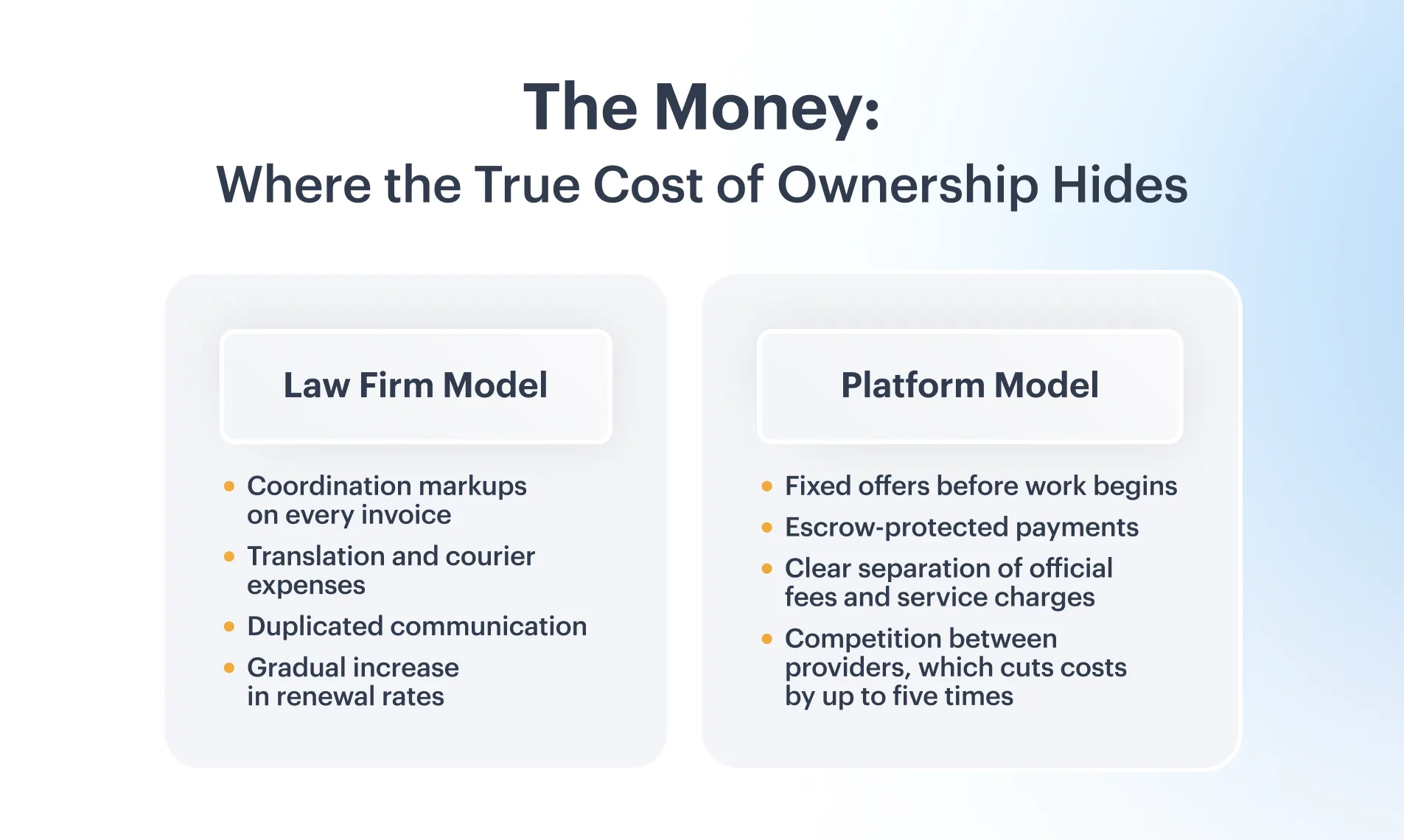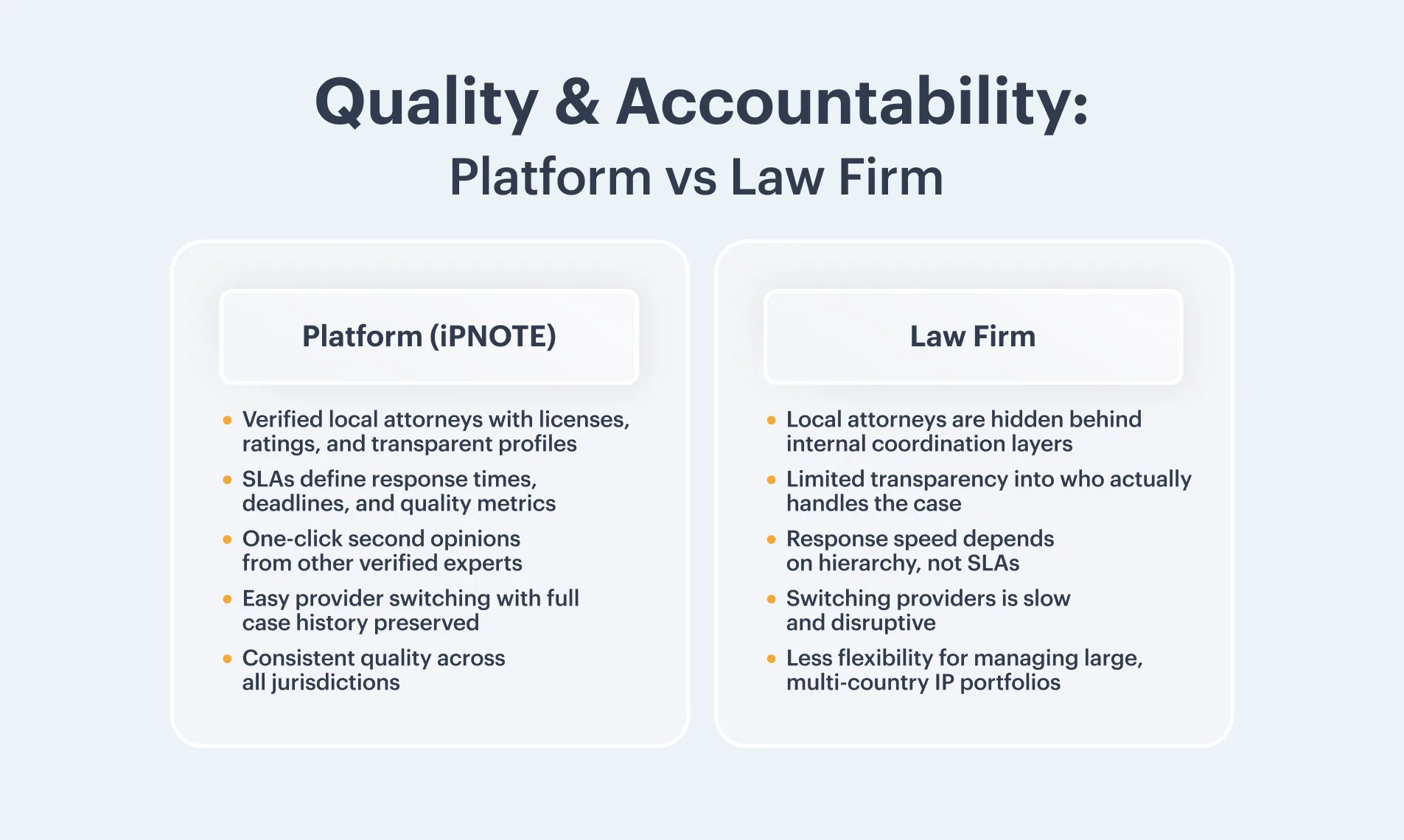What the Debate Is Really About
The discussion centers on how companies can protect and manage intellectual property in multiple countries without overpaying or losing control.
Both international law firms and global platforms promise convenience, yet each has its limitations. This article examines how their structures affect cost, transparency, and quality, and how modern IP management solutions help companies make informed decisions while keeping budgets under control.
Two Models and How They Work Behind the Scenes
International law firm (general contractor):
Coordinates a network of local patent and trademark attorneys. Communication, invoicing, and reporting go through several layers, which leads to slower updates and higher coordination fees.
Global IP platform (iPNOTE):
Provides a verified marketplace of local attorneys within one digital workspace. Deadlines, tasks, invoices, and reports are managed centrally, turning managing intellectual property into a clear and automated process.
The law firm adds intermediaries, while the platform connects clients directly with verified experts.

For companies managing intellectual property portfolios, transparent pricing eliminates hidden expenses and provides predictable budgets for renewals and filings.
Control and Transparency
Challenges with law firms:
Traditional firms often operate as a “black box.” Once the process begins, clients rarely see real progress. Updates arrive through scattered emails, spreadsheets replace structured systems, and information becomes fragmented.
Financial visibility also suffers: invoices often show aggregated totals without a clear breakdown of local costs, taxes, or attorney fees. This complicates reporting and makes it difficult for teams responsible for company intellectual property to assess efficiency or compare countries.
Another issue is dependency. Changing a firm can mean losing access to documents and case histories, creating a classic vendor lock-in.
Advantages of a platform:
A global IP platform such as iPNOTE centralizes all data and deadlines in one system. Each patent, trademark, or design is visible in a unified dashboard by country and provider. Statuses update automatically, and deadlines trigger reminders without manual tracking.
Financial transparency improves as well. Each task displays its full cost structure — government fees, local agent costs, and service charges — before approval. All invoices, payments, and documents stay stored in one place, accessible to both legal and finance teams.
Clients retain ownership of data and can export files anytime. Secure access settings (SSO, RBAC, audit logs) ensure compliance and safety. If needed, the provider can be replaced instantly without losing progress or records. For companies with complex intellectual property portfolio management needs, this model ensures complete visibility and control across all jurisdictions, helping teams focus on results instead of administrative coordination.
Quality and Accountability
In both models, the work is ultimately performed by local attorneys. The difference lies in how they are selected, managed, and evaluated.

Platform Approach:
A global IP platform such as iPNOTE creates a transparent environment for managing intellectual property through verified and rated local providers. Each attorney is checked for license validity, jurisdictional experience, and professional background before joining the marketplace.
Clients can view full profiles, including case histories, reviews, and pricing, allowing them to choose based on measurable criteria rather than reputation alone.
All cooperation operates under Service Level Agreements (SLA) that define response times, deadlines, and quality metrics. This structure ensures consistent performance across all regions. If a client needs an additional check, they can request a second opinion from another verified expert in one click, gaining an independent review without delays or negotiations.
Switching providers is straightforward and safe. The entire case history — documents, correspondence, invoices, and audit logs — remains available inside the platform, so no data is lost when replacing a local attorney. This flexibility allows companies managing large intellectual property portfolios to maintain service quality while avoiding disruptions.
Law Firm Approach:
An international law firm works through centralized agreements where accountability is formalized, but communication and coordination depend on internal processes. Clients often do not know which local lawyer is responsible for their case or how many intermediaries are involved in communication.
While responsibility is established in the contract, workflow transparency is limited, and reaction times depend on the firm’s hierarchy. For organizations managing company intellectual property across several jurisdictions, this can lead to slower execution and reduced flexibility.
Modern IP management solutions based on platform models combine verified legal expertise with the flexibility of real-time control, ensuring that accountability and efficiency go hand in hand.
Scaling and Timelines
Expanding protection across several countries requires speed and coordination.
Law firms often rely on sequential approvals, delaying filings for weeks.
Platforms like iPNOTE enable parallel workflows, allowing filings in multiple jurisdictions within the same day.
Teams receive local offers within hours, approve budgets instantly, and start work without waiting for long approval chains.
For organizations managing intellectual property portfolios, this approach reduces both time and cost while keeping performance measurable.
Security, Data Ownership, and a Smooth Exit
In the traditional law-firm model, trademark data, deadlines, and documents are often stored in internal systems that clients cannot fully access, making migration slow, expensive, and dependent on the firm’s availability.
A platform-based approach works differently. Clients retain full ownership of their entire portfolio, and all materials — deadlines, filings, POAs, invoices, correspondence, and evidence — can be exported at any time in open formats such as CSV, XLSX, JSON, ZIP, or PDF. Access is protected through enterprise-level security, including SSO, role-based access control (RBAC), permission tiers for internal teams and external counsel, and a detailed audit log that records who performed which action and when.
Most importantly, an anti lock-in architecture allows companies to switch providers or reassign cases without losing history, data integrity, or workflow continuity. Providers can be replaced instantly, and the full case record — documents, messages, deadlines, and task logs — remains intact. This flexibility is essential for company intellectual property management, where long-term accessibility, security, and uninterrupted control over the portfolio are critical for compliance and operational resilience.
When Each Model Fits
Law Firm Model Works Best When:
- You operate in one or two complex jurisdictions or litigation matters
- You require specialized legal strategy and direct representation
Platform Model Works Best When:
- You manage filings in several countries simultaneously
- You need predictable budgets and faster execution
- You want real-time visibility and measurable outcomes
Hybrid Approach:
The hybrid model combines platform transparency with the flexibility to collaborate with trusted professionals.
If a company already has a preferred local attorney or a “star” expert for specific cases, that provider can be invited into the platform and work within the same secure environment.
This allows businesses to handle complex tasks with their favorite professionals while benefiting from automation, shared dashboards, and centralized IP management tools.
All billing, deadlines, and documents remain visible inside the system, giving companies complete control over performance and cost.
Such a model fits modern teams focused on managing intellectual property globally. It blends the freedom to choose the best experts with the advantages of unified technology, ensuring that strategy and execution stay connected across the entire IP portfolio.
The Verdict and Next Steps
Law firms provide depth and experience, while global platforms deliver scalability, transparency, and cost efficiency.
In practice, the best solution is a verified local expert working within a unified platform.
The future of company intellectual property management lies in integrated systems that combine global coordination with local precision.
👉 Create a task today, get verified offers from local attorneys without markups, and see how iPNOTE simplifies managing intellectual property for global businesses.






